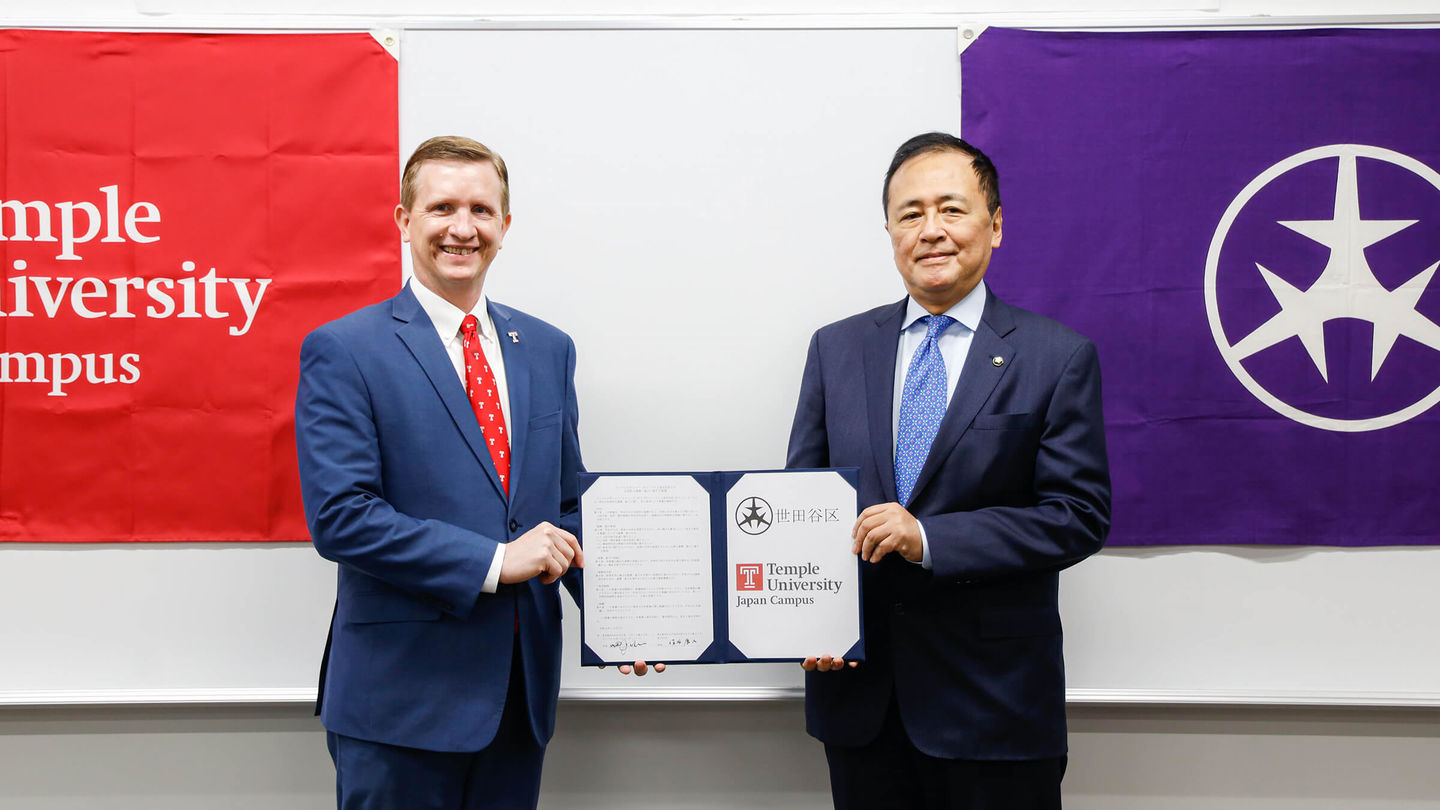TUJ Dean Matthew Wilson (left) and Setagaya City Mayor Nobuto Hosaka clinch collaborative agreement at the TUJ campus. Photo by Anthony Smith (TUJ student)
Building on the progress since the Japan campus of Temple University (TUJ) moved to Tokyo’s Setagaya City three years ago, TUJ and Setagaya have agreed to establish a formal comprehensive cooperative relationship to deepen collaboration on projects that promote cross-cultural communication and international understanding.
TUJ Dean Matthew Wilson and Setagaya City Mayor Nobuto Hosaka signed the collaboration agreement at a ceremony held at the TUJ campus on December 6, 2022. The agreement focused on the promotion of personnel exchange, mutual utilization of intellectual and physical resources, and collaboration on projects and research.
Since moving to Sangenjaya District of Setagaya City in 2019, the TUJ community has been actively involved in a series of academic programs and cross-cultural events with residents and students on a regular basis. The university has been offering summer English language programs to elementary and middle school students that have attracted huge interest each year.
TUJ students, staff, and faculty have also participated in many initiatives, including neighborhood clean-up activities and local festivals. TUJ has welcomed Setagaya residents to access its English-language library resources. In addition, TUJ students and faculty of the Japanese language department have been participating in events with the Crossing Setagaya project and the city’s international exchange division.
Commenting on the agreement at the signing ceremony, Setagaya City Mayor Hosaka said: “Temple University, Japan Campus and Setagaya City have been implementing collaborative projects centering on international exchange. Our collaborations include English language programs for elementary and junior high school students, and a cross-cultural exchange program with junior high school students held in Kawaba Village. In recent years, the world has changed dramatically, with the advancement of digitalization, the climate crisis, frequent natural disasters, the prolonged impact of the coronavirus pandemic, and soaring energy and consumer prices. In such circumstances, we believe it is more important than ever to diversify our collaboration with various entities. With this agreement in place, Temple University, Japan Campus and Setagaya City will further strengthen our collaboration and cooperation and devise ways to resolve various local issues and grow together.”
Dean Wilson said: “In the heart of Setagaya-ku, Temple University is offering a distinctive international experience at its Japan campus that prepares students from Japan, the United States, and 65 different other countries to make an impact in today’s society and tomorrow’s workplace. It is the mission of our globally ranked, American-based university to uplift and serve the surrounding community. As we move forward, it is our goal to add opportunities build community, transcend cultural boundaries, and serve the Setagaya City and Tokyo communities. Based on this new agreement, we can forge deeper connections with the local community and government to generate opportunities for our students to engage, serve, network, and positively impact the community.”
Established in 1982, TUJ has excelled in building bridges between cultures and advancing the globalization of higher education. TUJ is the largest and longest-running branch campus of a foreign university in Japan. The Japan campus is the flagship Asian operation of Temple University (Pennsylvania, USA), a top public university with more than 340,000 alumni worldwide. At TUJ, undergraduate enrollment has reached a record high of nearly 1,850 students in the current fall semester. In addition to the core undergraduate program, the university has graduate programs in education, management and law, as well as continuing education programs for adults, English language courses for children and students, and other programs to serve a wide range of needs. TUJ was recognized by Japan’s Ministry of Education, Culture, Sports, Science and Technology in 2005, and was officially designated as a Foreign University branch in Japan.
Other related stories
- India Diplomat Delivers Lecture to TUJ Students of Politics of the Global Economy Course (October 18, 2022)
- TUJ’s Undergraduate Enrollment Tops 1,800 in Fall Semester as More Overseas Students Arrive Amid Relaxed Border Restrictions (October 5, 2022)
- Setagaya City Mayor Hosaka and Officials Visit TUJ as Dean Wilson Welcomes with a Campus Tour (August 17, 2022)

